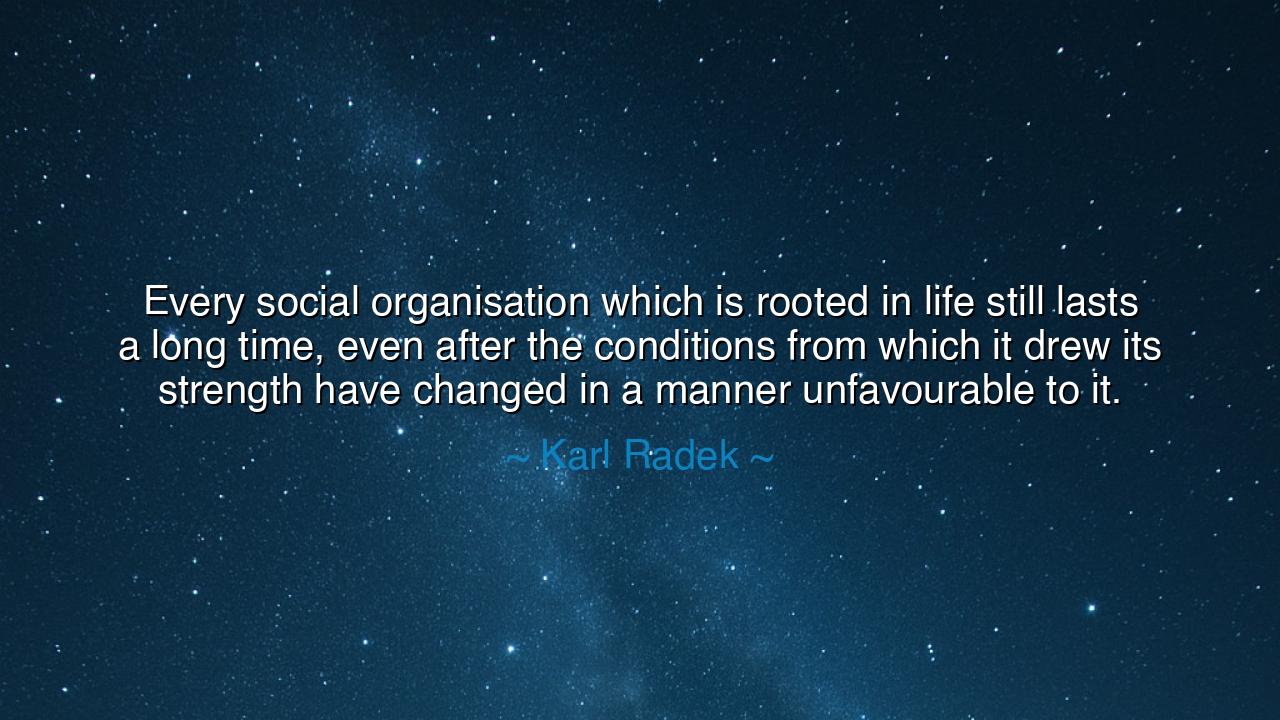
Every social organisation which is rooted in life still lasts a
Every social organisation which is rooted in life still lasts a long time, even after the conditions from which it drew its strength have changed in a manner unfavourable to it.






Karl Radek’s words, “Every social organisation which is rooted in life still lasts a long time, even after the conditions from which it drew its strength have changed in a manner unfavourable to it,” speak with the weight of history and the rhythm of the cycles of nations. In this truth, the ancients would see the same law that governs the forests and rivers: that which takes root deeply in the soil of life does not wither at the first frost. It lingers, carrying echoes of its former strength, even when the sun that once nourished it has long since turned away.
Radek, a revolutionary thinker of the early 20th century, observed with sharp eyes the endurance of social organisations—churches, monarchies, guilds, empires—that persisted long after the world that had birthed them had shifted. Though the conditions that once gave them power crumbled, these institutions survived, feeding on memory, tradition, and the inertia of habit. Like ancient ruins where the walls still stand though the city is gone, so too do such structures endure, carrying both a shadow and a weight across generations.
History gives us many examples. Consider the Roman Catholic Church. Its roots reached deep into the hearts and rituals of Europe, and even after the fall of the Roman Empire, even after kingdoms rose and fell, it endured. The Empire, which had once given it strength and protection, collapsed into dust, but the Church remained, shaping law, knowledge, and faith for a thousand years beyond Rome. Though the conditions changed unfavourably—barbarian invasions, shifting languages, and new political orders—the institution carried on, for it had sunk into the living fabric of human life.
Another example is the monarchy of England. The power of kings and queens once drew its strength from feudalism, divine right, and the sword. Yet when feudal bonds were shattered, when the divine right of kings was denied by Parliament, still the monarchy endured. It adapted, becoming ceremonial, symbolic, a keeper of continuity in a world transformed by democracy. The soil that once nourished it had changed, yet the roots in tradition allowed it to remain. The people, bound by identity and ritual, sustained it even when its old power had faded.
The lesson is not that such organisations are immortal, but that what is rooted in life—woven into daily ritual, memory, and identity—does not vanish quickly. Just as an uprooted tree may continue to live for a time, drawing on hidden reserves, so do social organisations linger, even when their purpose wanes. Their strength lies not only in function but in the emotional, spiritual, and cultural bonds they cultivate within a people.
For us who live in changing times, this wisdom carries both warning and counsel. We must ask: what organisations and customs do we continue to uphold, not because they serve us, but because they have endured beyond their time? Are there traditions that stifle growth? Are there institutions that remain because they are rooted, even though they no longer give life? The ancients would counsel discernment, for to honour roots is wise, but to remain enslaved to what no longer nourishes is folly.
Yet this truth also speaks of hope. If you would create something that endures, root it deeply in life. Do not build only on power or wealth, for these change as the tides. Build upon the rhythms of human need, upon shared values, upon the bonds that tie heart to heart. That which is woven into the soul of a people will survive even the fiercest storm.
Thus, take this teaching into your own life: when you build—whether a family, a community, or an endeavour—ask yourself, “Am I rooting this in the living soil of what matters most?” For only that which is grounded in life will outlast the turning of the ages. Let your works be like oak trees, not shallow reeds, and they will endure beyond you, a shelter for future generations.






AAdministratorAdministrator
Welcome, honored guests. Please leave a comment, we will respond soon